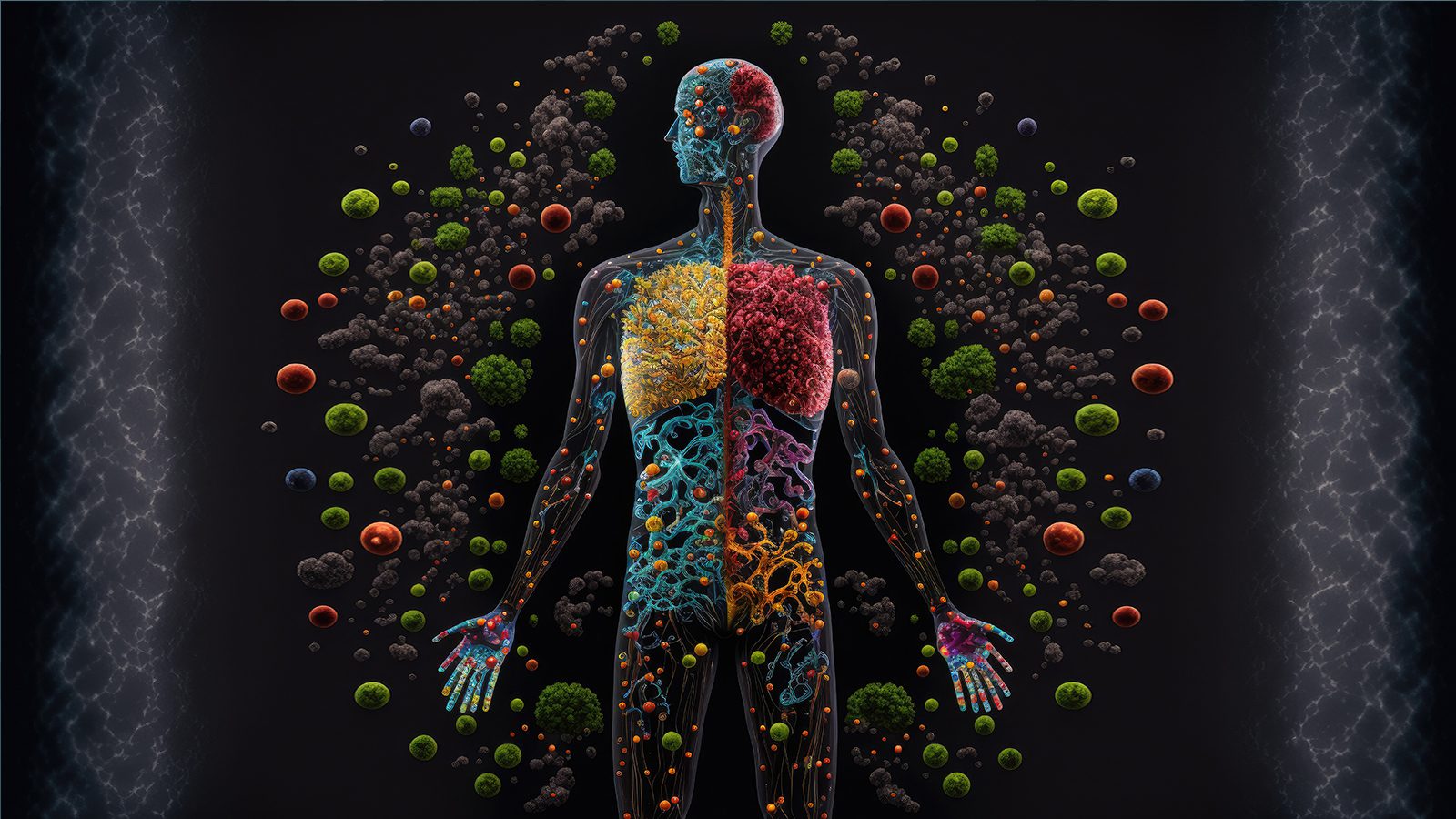In recent years, scientists have made remarkable discoveries about the intricate ecosystem thriving within the human body – the human microbiome. Composed of trillions of microbes, this fascinating collection of microorganisms plays a vital role in shaping our overall health and well-being. The human microbiome acts as a silent companion from the digestive system to the immune system and even influences mental health.
Understanding the connection between the human microbiome and better health can improve overall well-being. It is not only a scientific breakthrough but also holds the potential to revolutionize our approach to healthcare. By delving into the world of microbes and their impact, we can unlock valuable insights that enhance our well-being.
The term “human microbiome” refers to the complete set of genes, microbes, and their collective genetic material within and on the human body. These microorganisms, often called “microbes,” include bacteria, viruses, fungi, and other microscopic organisms. The idea of harboring countless microorganisms might seem unsettling at first.
But it is essential to recognize that most of these microbes coexist with us in a mutually beneficial relationship. They form a complex ecosystem that works in harmony to maintain our health.
Importance of a Diverse and Balanced Microbiome
A diverse and balanced microbiome, characterized by microbial diversity and a healthy microbiota balance, is crucial in promoting better health. It supports optimal digestion and nutrient absorption by breaking down complex food components and enhancing the production of essential vitamins and metabolites.
Moreover, a balanced microbiome strengthens the immune system, acting as a barrier against harmful pathogens and reducing the risk of immune-related disorders. Additionally, the microbiome’s impact on the gut-brain axis highlights its significance in maintaining mental health and cognitive function.
By prioritizing the maintenance of a diverse and balanced microbiome, individuals can unlock its transformative potential for overall well-being. This potential encompasses gut health, immune function, and mental wellness.
Gut-Brain Axis: The Connection Between the Microbiome and Mental Health
The gut-brain axis is a vital communication link between the microbiome and emotions. It involves gut-brain communication and the influence of gut microbes on mood and emotions. Imbalances in the microbiota have been connected to mental disorders, indicating the significant role of a balanced microbiome in mental well-being.
The gut microbiome produces neurotransmitters and signaling molecules that directly affect brain function, including serotonin, a neurotransmitter associated with mood regulation. Disruptions in the microbiome can lead to imbalances in neurotransmitter production, potentially contributing to mood disorders such as anxiety and depression. Additionally, imbalances in the gut microbiota can trigger inflammation and compromise the integrity of the gut lining.
This allows inflammatory markers to enter the bloodstream and impact brain function, potentially leading to mental health issues. Recognizing the link between the microbiome and mental health opens up new intervention possibilities. Probiotics, prebiotics, and other approaches targeting the gut microbiota are being investigated as potential tools for managing and preventing mental disorders.
The Human Microbiome and Immune System Function
The human microbiome supports immune system function, promotes immune health, and improves microbial defense. It helps train the immune system to distinguish between harmful and harmless substances by exposing it to a diverse range of microbes and antigens. This education helps prevent immune overreactions and the development of allergies and autoimmune disorders.
Furthermore, the microbiome produces antimicrobial compounds such as bacteriocins, defensins, and short-chain fatty acids that inhibit the growth of harmful pathogens. These compounds bolster the body’s natural defense mechanisms. Individuals can optimize immune system function and resilience by maintaining a diverse and balanced microbiome.
Additionally, the microbiome acts as a physical barrier, preventing harmful pathogens from colonizing and causing infections. The microbiome competes with pathogens for resources and space by occupying various niches within the body, limiting its ability to establish itself. Moreover, the microbiome helps fortify the gut lining, preserving its integrity and preventing the translocation of harmful substances into the bloodstream. This barrier function contributes to overall immune system strength and reduces the risk of systemic infections.
The Human Microbiome and Digestive Health
The human microbiome, comprising the intestinal flora or gut microbiota, plays a vital role in digestion. It aids in breaking complex carbohydrates, producing energy-rich short-chain fatty acids for a healthy gut environment. The gut microbiota also synthesizes essential vitamins and facilitates the metabolism of bile acids, ensuring efficient fat digestion and nutrient absorption.
Additionally, it contributes to gut integrity by promoting mucus production and regulating immune responses. It safeguards against harmful substances entering the bloodstream. Cultivating a diverse and balanced microbiome and digestion promotes nutrient uptake and overall gastrointestinal well-being.
The Human Microbiome and Metabolic Health
The human microbiome significantly affects metabolic health, influencing energy extraction from food, metabolism regulation, and the development of metabolic disorders. It breaks down complex carbohydrates and dietary fibers, producing short-chain fatty acids that are energy sources. The microbiome helps regulate metabolism and fat storage. Gut microbiota imbalances are linked with metabolic disorders, indicating the microbial influence on weight.
Understanding and optimizing the microbiome through interventions like dietary modifications or probiotics may improve metabolic health outcomes and mitigate metabolic disorders. Exploring the intricate relationship between the microbiome and metabolism can pave the way for targeted interventions promoting a healthy and balanced microbiome.
The Microbiome and Skin Health
The skin microbiota, part of the overall microbiome, is vital in maintaining skin health. It supports the skin’s natural protective barrier, regulates inflammation and immune responses, and has implications for various skin conditions. The skin microbiota competes with harmful microorganisms, producing antimicrobial substances that help preserve the skin’s barrier function.
It also influences inflammation and immune responses, preventing excessive inflammation associated with skin conditions like acne, eczema, and psoriasis. Imbalances in the skin microbiota can contribute to dysbiosis and the development of skin issues. Understanding the relationship between the microbiome, skin microbes, and skin conditions offers insights into promoting skin health. It also teaches about proper skincare practices and interventions targeting a healthy microbial community.
Impact of Medications and Lifestyle Factors on the Microbiome
The microbiome is significantly influenced by medications and lifestyle choices, leading to potential disruptions and impacting gut health. Antibiotics, although effective in treating infections, can disrupt the microbiome by reducing microbial diversity and disrupting the balance of beneficial bacteria. This disruption, known as microbiome disruption, can have long-lasting effects on gut health.
Lifestyle factors, such as diet and stress, also play a crucial role in shaping the microbiome. Dietary choices can influence the composition and function of the gut microbiota. For instance, processed foods and low-fiber diets can negatively impact the diversity and balance of the microbiome. Additionally, chronic stress can alter the composition of your microbes, while factors like sleep patterns and exercise have been associated with a healthier and more diverse microbiome.
Promoting a Healthy Microbiome
Promoting a healthy microbiome involves implementing microbiome-friendly practices and incorporating microbiome-boosting strategies. Consuming a diverse range of fiber-rich foods, such as fruits, vegetables, whole grains, and legumes, provides essential nutrients and fibers that nourish the microbiome. Additionally, incorporating probiotics and prebiotics into the diet can enhance the diversity and balance of the microbiome.
Probiotic-rich foods like yogurt, fermented foods, and prebiotic-rich foods like onions and bananas support the growth of beneficial gut bacteria. Reducing stress levels and practicing good hygiene are essential microbiome-boosting strategies. Chronic stress can disrupt the microbiome, so incorporating stress-reducing practices like meditation, exercise, and sufficient sleep is beneficial.
Practicing good hygiene, including regular handwashing, helps prevent the transmission of harmful bacteria and maintains a balanced microbiome. Individuals should adopt these microbiome-friendly practices, such as consuming fiber-rich foods and incorporating probiotics and prebiotics. By managing stress levels and maintaining good hygiene, individuals can actively support a healthy microbiome and its associated benefits for overall well-being.
Microbiome Research and Future Implications
Advancements in microbiome research have opened up new possibilities for potential therapies and personalized medicine. Ongoing studies are delving into the realm of microbiome-targeted treatments. They aim to understand how manipulating the microbiome can improve outcomes in various health conditions.
Conditions like inflammatory bowel disease, obesity, and mental health disorders are being explored. These explorations aim to develop targeted therapies directly addressing the microbiome’s role in these conditions. Furthermore, the knowledge gained from microbiome research has laid the foundation for personalized medicine approaches. Healthcare providers can tailor treatments and interventions to their needs by analyzing an individual’s unique microbial profile.
This personalized approach has the potential to revolutionize healthcare, offering more precise and effective treatments while minimizing adverse effects. The development of microbiome-based diagnostics and treatments is also on the horizon. Researchers strive to identify microbial signatures associated with certain diseases, enabling early detection and intervention.
Microbiome-targeted therapies are being explored for various health conditions, while understanding individual microbial profiles opens up possibilities for personalized treatments. The future of healthcare may see the integration of microbiome-based diagnostics and treatments, revolutionizing how we approach and manage diseases.
Final Thoughts on Understanding the Role of the Human Microbiome in Overall Wellness
Understanding the role of the human microbiome in overall wellness is crucial for enhancing our health and well-being. The human microbiome plays a vital role in various aspects of our health, including digestion, immune function, mental health, and skin health.
By recognizing the link between the microbiome and improved health, we can actively work towards nurturing a diverse and balanced microbiome to promote overall well-being. Maintaining a varied and balanced microbiome is of utmost importance. A diverse microbiome ensures a wide range of beneficial bacteria, which supports various bodily functions and helps maintain a harmonious internal environment.
Balancing the microbiome involves adopting microbiome-friendly practices, such as consuming fiber-rich foods, incorporating probiotics and prebiotics, reducing stress, and practicing good hygiene. These efforts contribute to optimizing our microbiome health and, subsequently, enhance our overall well-being.
Understanding the intricate relationship between the human microbiome and improved health empowers us to take proactive steps in enhancing our well-being through microbiome health. By embracing a holistic approach that prioritizes a diverse and balanced microbiome, we can unlock the potential for a healthier and happier life.
















 Community
Community

